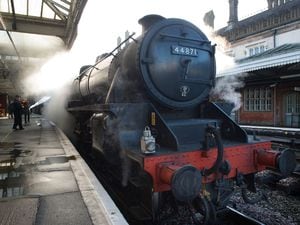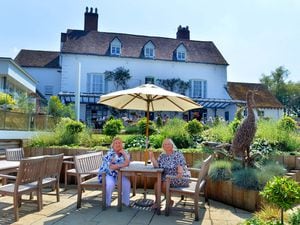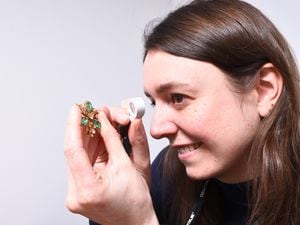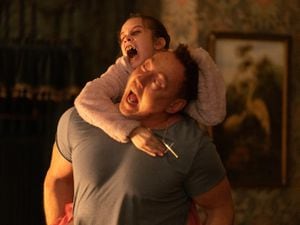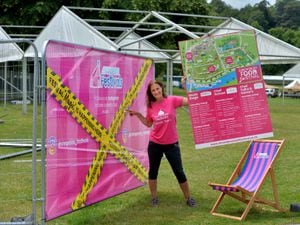EXCLUSIVE: Carol Decker - from Scouser to Salopian
She is a pop star who became one of the most recognised faces of the late 1980s.

And this week T'Pau's Carol Decker opens her heart and soul to the Shropshire Star.
Each day we are running exclusive extracts from her new autobiography, telling the story of her rise from awkward teenager in Shropshire to the face and voice of one of the world's most successful bands.
Today, in part one of our exclusive, six-day serialisation, she charts her early years in Shropshire and Liverpool:
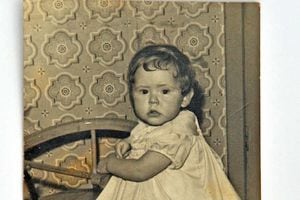
I was born in Huyton in the middle of Liverpool. I still have extended family there. I am spiritually a Scouser at heart, I suppose. Once a Scouser, always a Scouser: they claim you.
We lived in a grey, squat council block and each night we would hear the neighbours fighting through the wall. The block was next to a bit of tatty old land with a donkey on it. I've never forgotten that donkey.
Huge tracts of Liverpool had been bombed and across town and in Stoneycroft, where my nana Healey lived, whole corners had gone. I was born in 1957, little more than 10 years after the war. Liverpool still struggles to this day to be regenerated, so it was pretty shocking back then; it was seared in my mind as a place that was over – flattened. People were poor. The shipping industry was on the decline. That once proud city seemed to be dying. I remember thinking that I wanted to live somewhere that was beginning.
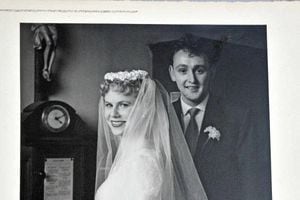
We were from a working class background. My mum was one of seven, Irish Catholic, and my dad was one of two, English Protestant, with some long-time-ago Dutch blood, hence the surname. He had a sister, Beryl.
My nana Decker was a tall woman with jet-black hair and dark brown eyes, like my dad. She was the manageress of a fruit and veg shop; back in the 1950s that was no mean feat. She was quite a trailblazer. I used to want to impress her. She was a bit of a Tartar, a very tough woman who frightened my mum when my parents were first married. In 1956 my mum and dad had to be married in a side altar in the Catholic church. There were no flowers and no choir. Purple cloths were draped over the statues. My mum was marrying in shame; dad was a not a Catholic!
The mutual enmity existed on both sides of the family. As far as my hoity-toity grandma Decker was concerned, my dad was marrying a lower class left-footer, while mum's family considered my nana Decker a snob. There was no love lost between them and never any big happy family get-togethers.
As well as being disaffected with one another, the two families were across a religious divide. Their relationships soured my view of religion. Early on in my life my overall impression of the church/religion was that it divided people. It created prejudice that parents passed down to their kids. I didn't want any part of it so I opted out early when I was ten. We had by then moved to Wellington in Shropshire. Mum had continued to send me and my brother to church. Aged 10, I confessed – well I was Catholic – to my mum that not only did I not want to go to church anymore but that I had been spending my collection plate money in the sweet shop. Oh God, I was going to burn. Mum just looked at me for what seemed like an eternity and then said, 'OK but don't tell nana.'
Until her death in the mid '70s the family spent a lot of time concealing things from nana Healey. And I swear if the poor woman had put all the money she spent on lighting candles in church into a savings account she could've lived in a mansion and not a council house. Devout as she was, almost every sentence started with 'Jesus, Mary and Joseph'.
Although not well off, I don't remember going without anything. At Christmas my parents would creep in and put presents at the end of the bed. My dad had a Santa suit and we were told that you got a cabbage or cauliflower left at the end of the bed if you spied on Santa. One night I couldn't sleep for excitement and my dad had come in from the pub, a bit tiddly. He put on the Santa suit and placed socks with tangerines and nuts in at the foot of our beds.
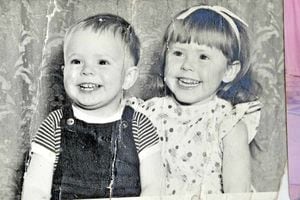
Through my lashes I saw a shadow moving across the room. I was terrified that Santa would know that I'd spied and I would get a cabbage. My brother and I woke up at 5.30am on Christmas morning. There was nothing at the end of our beds but fruit and nuts. I thought there were no presents because I'd spied on Santa. So we went running into our parents' room screaming. Of course, what they'd done was bought us gifts that were too big to lug into the room; they'd left them in the lounge. I'd got a big cot and a dolly while my brother – and they soon regretted this – got a drum kit.
Carol Decker's autobiography Heart and Soul is published on Monday, January 25 priced at £16.95.
Readers of the Shropshire Star and Express & Star can order copies at a reduced rate of £15.95 , including free p&p here.
To qualify for the reduced price, orders must be placed online by midnight on January 24.
Going out as a family was a different thing then. Kids weren't allowed in pubs and the pub was a big part of life in Liverpool. I remember often sitting in the car with my brother and my mum. Dad would come out with crisps and lemonade but poor mum had to sit in the car with us. There was always a saloon bar and the off-licence. The saloon bars had frosted out windows like there was something going on that you weren't supposed to see. The lounge was where you sat with your girlfriend until you married her. After the wedding you'd go back into the saloon bar with your mates and she'd have to sit outside in the car with the kids.
Dad worked really hard and got a job in a small supermarket called Waterworths in Wellington. That gave us our chance to get out of the council block in Liverpool. I was seven. Wellington couldn't have been more different. It was a small rural market town and we moved to a new-build estate. Our house, 53 Hordley Road, was a three-bed semi-detached with a front and back garden; it cost around £2,500 and dad had to have a mortgage. Oh my God, I spend that on shoes! We were going up in the world. I settled awkwardly into the local school, St Patrick's Catholic Infant and Juniors. I had a broad Liverpool accent and I was very skinny with orange hair, round National Health glasses and a patch over a lazy left eye. I also had buck teeth. There wasn't a queue to get to know or sit by the new girl.
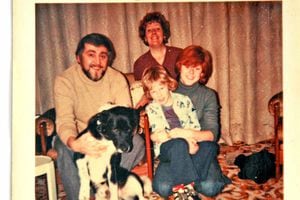
My little brother Gary faired better. He was good at sports and made friends easily. He was a very beautiful boy. He had twinkling hazel eyes, a smattering of Anne Of Green Gables' freckles on his nose, white-blonde hair and butter wouldn't melt in that perfect mouth of his. My mum adored him – what is it about mums and their sons? – and if he had done something wrong he would lie through his teeth or blame me. She would always believe him as he was so cute. My son Dylan is exactly the same.
My dad was a massive personality and it was reflected in his music. I was raised on big voices like Barbra Streisand, Shirley Bassey, Tom Jones and Maria Callas. That's why I sing so big and loud. I don't know if I was physically meant to do that, but I made myself do it because I equated a great voice with a big voice; that's what formed me. I did all my singing into a hairbrush in the mirror. I used to put all my dad's records on and sing along or get my brother's Rod Stewart and The Faces albums. My brother could hold a tune too. He's no virtuoso on anything but he can pick things out on the piano or guitar and hum along.
I passed my 11-plus at the local Catholic school. I remember those stats to this day. The C of E junior across the road from St Patrick's had four pupils fail out of a class of 30. Four kids in my class of 30 passed it. I finished my 11-plus so quickly that I was really worried that I'd done something wrong. I kept leafing through the paper because everyone was going really slowly and I just flew through it. After the results came, myself and a boy called Patrick McTiernan were asked to bring our parents in with us. We were invited into headmaster's office, and I thought: 'Oh my God, it was a disaster, I am officially stupid.'
He said to adults, 'You've got university material here.' The two of us had sailed through the exam. Academically speaking, it was my high water mark and I never did it again. It was a fluke. I'm really good at the process of elimination, at multiple-choice stuff, which is why I do OK on TV quiz shows, but I don't really know anything in depth. Patrick, on the other hand, had started building TVs as a hobby at age 11!
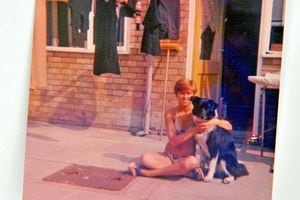
Soon after, I found myself at a snotty girls' grammar school, where I was a misfit for the next eight years. Everybody else seemed to be doing well in their subjects but I was forever struggling with my maths. I was pretty good at English and drama, as well as singing, but I wasn't exactly egghead of the year.
My father was bursting with pride that I'd earned a place at Wellington Girls' High School. We'd gone from council flats in Liverpool to the local grammar school in a few years. My brother also passed his 11-plus. He went to the boys' grammar school.
Miss Barnes, the headmistress at Wellington Girls High School, was a scientist and mathematician and so the school had a bias towards those subjects. I did better in the creative arts. I was encouraged into the drama club and I wasn't bad at art. I was also pretty good in the choir. The arts, however, were viewed more as a hobby.
The clever girls were studying geography, maths, physics, chemistry and biology. We had lots of Oxbridge graduates. I was in the wrong school, really. I suppose if my parents had been a bit wealthier they'd have sent me to a stage school. But here I was in this academic school, a fish out of water who'd had a lucky day on her 11-plus. To deflect from my bewilderment I became the class clown. I spent a lot of time outside the class in disgrace.
If Miss Barnes was patrolling the corridors I did my best to flatten up against the wall and become invisible. Being very skinny I think I managed it a few times. Our maths teacher, Mrs Price, could barely hide her contempt for me. Her favourite pastime was to ask me to explain to the class equations that she knew damn well I did not understand.
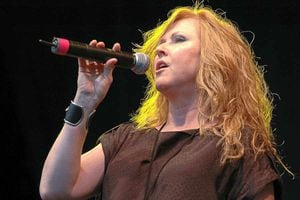
As I stammered and flushed and squirmed she would pronounce that, 'If you can't answer this question, you do not deserve a place in this school.' That is a quote from 40 years ago seared into my brain. As far as Mrs Price was concerned, I did not deserve my place.
We had double maths on a Tuesday and I would develop a chronic and very real stomach ache every Monday evening. I had some good times and a lot of bad times at school, at times reasonably popular but also scorned, bullied and ostracised. I was frequently overlooked and only very occasionally praised.
And yes, I did hope every miserable cow that ever gave me a hard time there was green with envy when they saw me on Top of the Pops.
Kiss my skinny white ass Mrs Price!

